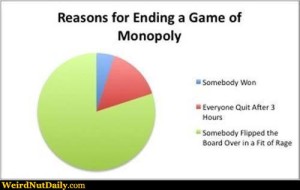The idea for today’s article started with a simple question: “How can I be a better online competitor?”
I’ll be honest here. I rage. I am an angry, vile, nasty person when the spirit of competition has possessed me. I’ll lie. I’ll cheat. I’ll take you out back behind the outhouse if I think it will give me some kind of competitive edge. Competition is brutal. If we’re being real here I am pretty certain a few seasons of Sons of Anarchy is loosely based on the fallout of a few family night games of Monopoly. Competition brings out the worst in people and honestly why shouldn’t it? Winning feels amazing. Winning means you have sent your loved ones fleeing before you under the hard rule of Park Place and Boardwalk Ave. They have been sent home in embarrassment and defeat and that feels fucking fantastic. Now lets imagine that I have complete anonymity and the people I am playing against are strangers whom I do not know, see, or have any real empathy for. As Iron Maiden so poetically put it in The Number of the Beast: “Woe to you, oh earth and sea, for the Devil sends the beast with wrath.”
And yet, despite all of these things I do not tend to be the best at what I play. In fact, I tend to be pretty mediocre. I can talk shit on the level of Tupac himself but my aim is far from extraordinary. Which got me thinking what is holding me back from making the transition from your average run-of-the-mill online gamer, to the competitive elite who rule the upper rungs of the matchmaking ladder? The more I thought about this question the more I realized the only thing holding me back was myself.
The Differences and The Animal inside
The differences between online games and real life competition are too numerable to count. Everything from the appearance of the game, to the basic format of play, is different. In real life, games do not involve killing. That’s called crime. In games there is no such thing as physical exertion. That’s called exercise. Gamers use controllers to move pixels on a screen while reality forces you to actually participate in what you are doing. In other words, in the real world you are connected.
One of the main principles of “offline” competition is that you are face to face with your fellow competitors. You are not privy to just their voice and gender spoken through a microphone. You are able to look into their eyes as you attempt to crush them. You are able to clash and call people colorful curse words to their faces. In other words, you see the human beings playing opposite you as people. You empathize, you laugh, and you are playing with your fellow man.
Online games do not operate on the same principle. Online your opponent’s gamer tag is Xx420Yolo360NoscopeHArdcorexX and he has informed you that your parents deserve cancer for birthing such an unskilled piece of useless shit. And that’s putting it lightly. For Mr. 420Noscope is 11 years old and he knows such things, there is no need for questions.
Other than the more obvious problems facing Mr. 420Noscope, there is a far more subtle and important undercurrent. When he says your parents deserve cancer, he says they have earned the condition because you are useless. This implies that he is blaming you for sucking at the game. With this, one of two things has happened. Either your team has lost, in this case he has informed you that you are the reason, or you have won but performed terribly and he has seen fit to point it out to you. In both cases Mr. 420Noscope is infallible, leaving you to shoulder the responsibility for the teams struggles.
It is important to note that this exchange always shifts the blame for the teams struggles. Similarly, praise remains constant. This is because of a very important and key concept to understanding competition. Self-identity.
Improvement and the Journey through Enlightenment
As Mr. 420Noscope’s gamer tag has informed us he is a hardcore gamer. He subscribes to the philosophical group that thinks they are the elite because they put in the time and effort to be good. People outside of this group are called “Casuals,” which is anybody who does not live and breathe the game but only plays it from time to time. I would like to argue that the reason Mr. 420Noscope is still playing with casuals instead of pro’s is because he shifts blame exactly like above. His misplaced identity as a gaming elite makes it so he cannot accept the fact that he is bad at the game. Instead he blames outside factors when he loses and praises himself when he wins. A self-fulfilling prophecy that will always confirm that he is as good as he thinks.
Now I want to be honest with you guys. Mr. 420Noscope is the 11-year-old version of me. In fact, he is still apart of me to some degree today. Earlier, when I was talking about my inability to improve, I was mistaken in my identity as hardcore. I used to be convinced that because I played a ton of games I was not a casual player. I had completely missed the real meaning of the words. A casual is not strictly someone who plays less, it is someone who plays for fun and is too lazy or otherwise preoccupied to do the real grunt work involved in being skilled.
As a Hearthstone player am I going over my old games studying them for mistakes? No. Am I watching replays in Counter-Strike to see how I aim and move? No. In League of Legends am I religiously watching videos of the pros, studying what they buy and when? No. These are the kind of activities that make the differences between hardcore and casual. Time is a non-issue.
Competitive spirit plays to our weakness as human beings, which is, quite ironically I might add, admitting we are weak. It is far easier to shift the blame for a loss or a missed shot onto some other player or mechanic than to admit a personal fault. Especially online where we lack face-to-face interaction with people we can talk to and debate with. Online the only person you have to convince is yourself.
Several years ago I watched an interview with Kobe Bryant on the story of his success as a basketball player. The interviewer asked Kobe what it was like to have such a domineering talent, what if felt like to be so naturally gifted. He responded by telling the woman that he had never seen himself as such. He told her that he honestly thought he was far from what he could be. Because of this, every day after practice, he would shoot till he sunk two thousand baskets. He told her that he thought his shooting still needed quite a bit of work and so he followed this routine religiously.
What struck me about this interview was the fact that one of the, if not the, best basketball players in the entire world thought his game was still subpar. He could be arrogant. In fact, he could act exactly like Mr. 420Noscope when his team lost or struggled. He could call them names and curse and moan. And the funny thing is, he would be justified. Except he doesn’t, instead he shoots thousands of hoops after practice because his shots need work. He studies game recordings; he works out and trains his cardio, all so he can be the best. And it’s because of these things that he has improved.
Sometimes when I write a strange and mysterious thing happens. I show myself how seriously dumb I am. The key to being a better competitor is to focus on yourself. Don’t rage, despite the therapeutic high. Don’t shift the blame because your embarrassed. Man up and take ownership of flaws and fix them. It does not matter if you are standing on the pinnacle or sitting ball height underneath. The only way to be the best is to make sure you play the best. And that doesn’t come from acting like a dick.











